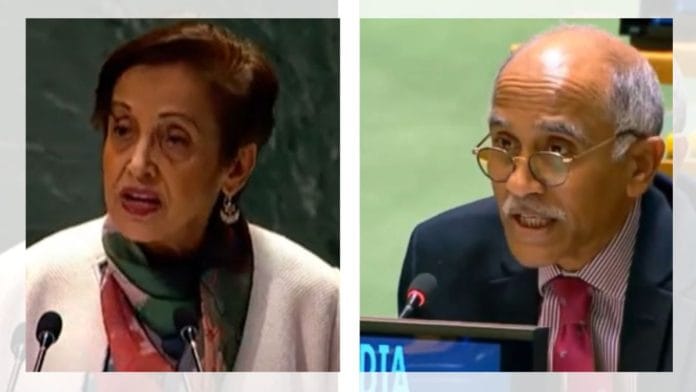New Delhi: India has attacked Pakistan’s “fanatical mindset” at the UN General Assembly, adding that its repeated mentions of Kashmir as “occupied territory” will neither validate its claims nor justify its continued practice of “cross-border terrorism”.
The comments came after retired Pakistani diplomat Tehmina Janjua drew a comparison between Palestine and Kashmir as “occupied territories” in her speech at an informal UN General Assembly meeting to commemorate the International Day to Combat Islamophobia—15 March.
At the meeting, Parvathaneni Harish, the Permanent Representative of India to the United Nations, New York, condemned Janjua’s “unjustified reference” to Kashmir as a “habit” of Pakistan. “The fanatical mindset of this nation (Pakistan) is well known, as is its record of bigotry. Such efforts will not change the reality that Jammu and Kashmir was, is and will always be an integral part of India,” Parvathaneni Harish responded.
On the International Day to Combat Islamophobia, Tehmina Janjua, the former foreign secretary of Pakistan from 2017 to 2019, triggered the stand-off, saying, “Undoubtedly, Islamophobia is a significant driver of the horrific killings of Muslims in occupied territories such as in Indian-occupied Kashmir and Palestine.”
The International Day to Combat Islamophobia—15 March—is an annual observance the United Nations introduced in 2022 to address and combat Islamophobia globally. The date was selected to mark the anniversary of the 2019 mass shootings in Christchurch mosque, New Zealand, resulting in the deaths of 51 Muslims during Friday prayers.
Starting his speech with Holi and Ramadan greetings, Parvathaneni Harish, on his part, highlighted India’s diversity and pluralism. His rejoinder was: “With over 200 million, India is home to one of the largest Muslim populations in the world … We stand united with the @UN membership in condemning incidents of religious intolerance against Muslims.”
Harish also flagged that religious discrimination was a broader challenge that affects followers of all faiths. Only after acknowledging that “religio-phobia” threatened the diverse fabric of society could there be any meaningful progress, he added.
Voicing concerns over the alarming rise in violence targeting places of worship and religious communities, Harish stressed that addressing the issue required a steadfast commitment and concrete actions by all UN member states, upholding the principle of equal respect for all faiths.
“All countries must commit to equal treatment of all their citizens and not practice policies that promote religious discrimination. We must also ensure that the education system does not perpetuate stereotypes or encourage bigotry,” Harish said.
Harish further stated that any deliberation on issues of faith must seek to unite, not divide. “The fight against Islamophobia is inseparable from the broader struggle against religious discrimination in all its forms,” he said, calling on nations to strive for a future where every individual, regardless of their faith, can live with dignity, security, and respect.
In her speech earlier in the day, Tehmina Janjua called Islamophobia the “hatred of our times”. Citing instances such as the demolition of mosques to build temples, ban on hijabs, charges of love jihad, cow vigilantism and demonisation of Muslims in history books, she said that the phenomenon was not new but had taken on a “virulent form”, impacting many regions and becoming an “existential threat” to Muslims in many countries.
The rising awareness about Islamophobia in the backdrop of the Gaza conflict, with some countries attempting to identify the causes of hatred, documenting crimes against Muslim residents, or bringing about policy changes, was a “case of too little too late”, said Janjua.
While explaining the dynamics of Islamophobia in the West and Asia, she also said, “Disturbingly, there is one major Asian country that is in thrall of an extremist ideology that primarily targets Muslims, an ideology promoted by the state itself.”
(Edited by Madhurita Goswami)
Also Read: Train hijack by Baloch insurgents in Pakistan holds critical lesson—railways can drive geopolitics






